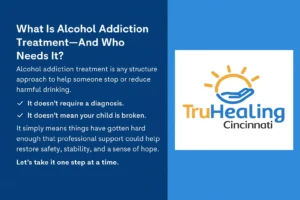You’re scared. You’ve been watching things get worse—not better.
Maybe it started with a missed class, an angry outburst, or a gut feeling that something wasn’t right. Now you’re here, searching for alcohol addiction treatment, trying to understand terms you never thought you’d need to know. Trying to figure out how to help without pushing them away.
This isn’t where you imagined your family would be—but here you are. And even though it feels overwhelming, there is a way forward. TruHealing Cincinnati’s alcohol addiction treatment programs are designed to meet families in this exact moment: confused, afraid, and searching for real help that works.
Let’s take it one step at a time.
What Is Alcohol Addiction Treatment—And Who Needs It?
Alcohol addiction treatment is any structured approach to help someone stop or reduce harmful drinking. It doesn’t require a diagnosis. It doesn’t mean your child is broken. It simply means things have gotten hard enough that professional support could help restore safety, stability, and a sense of hope.
Treatment can look very different depending on a person’s needs. It might be:
- A few therapy sessions a week
- A full residential program
- Or something in between
Your child doesn’t have to “hit bottom” to deserve care. If drinking is causing harm—whether that’s emotional distress, risky behavior, or disruptions to school or work—treatment is worth considering.
For young adults, alcohol addiction can be deeply entwined with mental health, identity struggles, or trauma. Treatment isn’t just about stopping drinking—it’s about rebuilding what’s underneath.
Three Things You Can Do Right Now (Even If They’re Not Ready)
One of the hardest things about parenting through addiction is feeling powerless. But you’re not.
Here are three grounded actions you can take today:
1. Connect with a professional—even if your child won’t.
Reach out to a treatment center like TruHealing. You can ask questions, learn what’s available, and start gathering support for yourself. Many parents make the first call before their child is willing to engage.
2. Start documenting what you’re seeing.
Write down specific incidents, mood shifts, or concerns. Not only does this help validate your instincts, it also provides useful information for future treatment providers.
3. Release the idea that you must fix this alone.
You didn’t cause this. You’re not supposed to have all the answers. Letting others guide you through it isn’t weakness—it’s wisdom.

Understanding the Types of Alcohol Addiction Treatment
Not all treatment is the same—and that’s a good thing. Your child deserves a plan that fits their reality, not a one-size-fits-all approach. Here’s how different levels of care work:
| Level of Care | What It Looks Like | When It’s Helpful |
|---|---|---|
| Detox | Medically supervised withdrawal process | If your child needs help stopping safely |
| Residential | 24/7 care in a supportive setting | For severe addiction or mental health crises |
| PHP (Partial Hospitalization) | Day program with clinical support, no overnight stay | For those needing structure without full-time admission |
| IOP (Intensive Outpatient) | Group + individual therapy several days/week | Great for continuing school or work while in treatment |
| Outpatient Therapy | Weekly or biweekly sessions | Ideal for early-stage issues or ongoing support |
At TruHealing Cincinnati, these levels can be customized to meet young adults where they are—and adjusted as they stabilize and grow.
If you’re outside Cincinnati but nearby, you can also explore options for alcohol addiction treatment in Lexington, Kentucky or Louisville, Kentucky. Support shouldn’t be limited by zip code.
“But They Don’t Want Help…”
This is where so many parents get stuck.
Your child might deny there’s a problem. They may resist the idea of treatment or even get angry when you bring it up. This doesn’t mean you’ve failed—it means they’re scared, overwhelmed, or not ready to face what’s happening.
Here’s what you can do:
- Don’t force the label. Let go of trying to convince them they’re “an alcoholic.” Focus instead on the impact drinking is having on their life.
- Speak from your heart, not from fear. Say things like, “I’ve been really worried lately,” instead of “You need to stop drinking.”
- Get help for yourself. Talking with a family therapist or addiction specialist can give you tools and scripts to use—and a place to release your own fear and grief.
Remember, willingness can shift over time. Your calm, consistent presence matters more than the perfect words.
What Makes Treatment Work for Young Adults?
Young adults face unique challenges when it comes to addiction—and recovery. They’re navigating identity, independence, social pressure, and sometimes untreated trauma. Programs that understand this developmental stage offer the best outcomes.
Here’s what to look for in alcohol addiction treatment for young people:
- Age-appropriate therapy groups so they don’t feel out of place or misunderstood
- Co-occurring mental health support for issues like anxiety, depression, or trauma
- Family involvement that honors your role without making you the “problem”
- Skill-building and structure to support real-life transitions like jobs or school
At TruHealing Cincinnati, we don’t just treat symptoms—we build trust. Because we know healing happens in relationship, not isolation.
Signs It Might Be Time for Treatment
Still unsure whether treatment is necessary? These signs may help clarify things:
You might consider treatment if your child is:
- Drinking alone or in secret
- Struggling to meet school or job responsibilities
- Experiencing mood swings or mental health symptoms
- Lying or becoming defensive about alcohol
- Having legal or disciplinary issues
- Seeming disconnected, depressed, or increasingly isolated
If any of these feel familiar, it’s worth having a confidential conversation with a provider.
What If They’ve Tried Before and It Didn’t Work?
Many families arrive here with bruised hope. Maybe your child has already been through a program—or even several. It’s common to think, “What’s the point of trying again?”
Here’s the truth: Relapse or incomplete recovery isn’t failure. It’s often part of the process, especially for young people.
A program that didn’t help once may not have been the right fit. Your child may be more ready now than they were before. Or maybe you have more clarity and strength to support the process.
Recovery isn’t linear. It’s a spiral. Each attempt builds something.
FAQ: Parents Ask, We Answer
How do I talk to my child about going to treatment?
Use “I” statements. Try:
“I’ve noticed you seem really unhappy lately. I’m scared and I want to help. Can we talk to someone together?”
Avoid labeling or lecturing. Focus on care, not control.
What if they refuse to go?
They might. But you can still seek guidance. Many families benefit from family therapy, intervention specialists, or simply knowing their options. Sometimes it’s about planting a seed, not forcing a decision.
Will they have to leave school or work?
Not necessarily. Outpatient programs like IOP allow for flexible scheduling, so young adults can stay connected to education or employment while receiving support.
How involved will I be as a parent?
At TruHealing, family support is built in. You’ll never be left in the dark, but your child’s privacy is also respected. We’ll work with you to find the right balance.
Can I get help even if they won’t go?
Yes. 100%. You deserve support, tools, and relief even if your child isn’t ready yet. We’re here for you too.
You Don’t Have to Know Everything—Just the Next Step
When your child is in crisis, it’s easy to freeze. To wait until it’s “bad enough.” To second-guess everything. But your love—shown in action—is the most powerful force in the room.
You don’t have to be perfect. You just have to begin.
Ready to talk?
Call (888) 643-9118 to learn more about our alcohol addiction treatment services in Cincinnati, Ohio.
We’re here when you’re ready.


